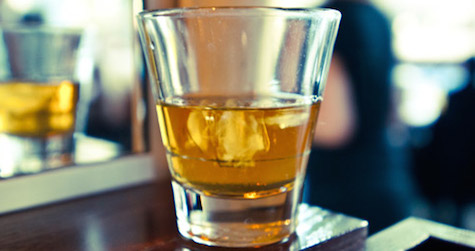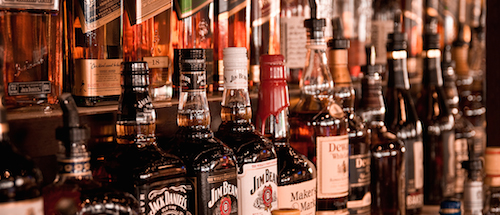
Whiskey-related knowledge to share at your next cocktail party: welcome to our introduction to whiskey. These simple guidelines can help you figure out what kind of whiskey to order at a bar, and why you may like a certain type of whiskey more than another.
An Introduction to Whiskey
The history of whiskey ‘possibly’ begins four thousand years ago, when the Babylonians in Mesopotamia may have practiced distillation. However, the first actual recorded incident was in the 13th century, where Italian monasteries would distill the alcohol from wine for medicinal purposes. By the 15th century, the process has spread to Ireland and Scotland, and the first mention of whisky on record was in 1405 when the death of an Irish chieftain was pinned upon “taking a surfeit of aqua vitae” at Christmas (aqua vitae being Latin for distilled alcohol, the literal “water of life”).
Next came the important element of mass consumption: starting in 1536, King Henry VIII of England began dissolving the monasteries, and in the process sent monks to mingle with the general public. These fine gentlemen needed a way to earn money for themselves, and so their skill of distillation was used in homes and farms, sharing whisky with the masses. Soon after, the oldest licensed whiskey distillery in the world was granted its first license – the Old Bushmills Distillery in Ireland – and they began producing in 1608.
The process then traveled to the US with Irish and Scottish immigrants, where whisky became popular in many of the southern states. Whisky was even used as currency during the American Revolution, and when the Prohibition Era banned all sales of alcohol across the US, there was a clause that excluded “whisky prescribed by a doctor” and sold through licensed pharmacies.
Whisky vs Whiskey?
For the most part, either will do. Traditionally, ‘whisky’ is the British spelling, and so whisk(e)y that is distilled in Scotland will be labeled as Whisky (the same also applies to Canadian and Japanese whisky). The American spelling, also used by Irish brands, tends to favor the extra letter e as in ‘whiskey.’ Most people use the two interchangeably, and you can certainly hold down a verbal discussion without knowing the difference.

What is the difference between Scotch and Whiskey? What is Bourbon made from? Why is Rye called Rye?
Essentially, all things whiskey-related will come down to four elements: sourcing, mash content, the aging process, and the demographic region in which it is made.
What is Whiskey?
Whiskey is an umbrella term for spirits that are distilled from a ‘mash’ of fermented grains. These grains can be many varieties, and often a blend of several, but the most commonly used grain is corn.
What is Scotch?
To qualify as a Scotch the spirit must be made from malted barley, with many Scotches using nothing more than barley, water, and yeast. The spirit must also be aged in oak casks for no less than three years and must have an ABV between 40% and 94.8%. Finally, you cannot call your drink Scotch unless it was made 100% in Scotland. There are regions galore in Scotland, which all lend their own distinct tastes.
What is Bourbon?
Bourbon whiskey must be made from a grain mixture that is at least 51% corn. The fermentation process for this is often started by mixing in some mash from an older already fermenting batch, a process known as sour mash. Bourbon can be made anywhere in the United States but is strongly associated with the south. The spirit must be distilled to no more than 80% alcohol or 160 proof in new charred oak barrels.
What is Rye?
Rye is the trickiest of all whiskeys to define. You would assume that Rye whiskey is any booze distilled from only fermented rye mash. However, American Rye needs only 51% rye grain, and the only rule to label your whiskey as Rye in Canada is for it to have “some” rye in it, and to possess the aroma, taste, and character generally attributed to Canadian whiskey… whatever that may be to you.

Want to learn more about Whiskey?
We will continue to publish whiskey information and advice in the future, and build upon this Introduction to Whiskey article. Join our rewards program to ensure you receive emails with blog content.
This post was written with help from the resident whiskey experts at South Branch. They have one of the best whiskey lists of any Chicago whiskey bar and are happy to help you discover your way to the perfect whiskey for you.
by Bottleneck Management
